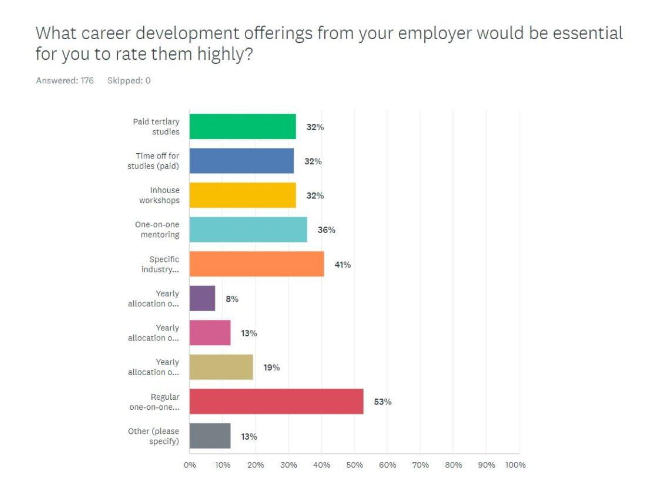Embracing Employee Aspirations: The Vital Importance of Constructive Feedback

In today’s competitive business landscape, fostering employee growth and development has become paramount for organisations seeking to attract, retain, and nurture top talent. Career development is a major factor influencing employees’ decisions. It ranks as the third most important reason why employees consider leaving their current roles. This underlines the significance of offering meaningful avenues for growth to keep our workforce engaged and motivated.
We recently conducted a survey among our Western Sydney employee database to shed light on their career development expectations from employers. While various avenues for growth were explored, one resounding theme emerged – the strong desire for regular one-on-one constructive feedback. This article delves into the survey results, emphasising the significance of this employee demand and urging employers to prioritise honest conversations for a more engaged and motivated workforce.

The survey revealed a plethora of responses that underscore the workforce’s enthusiasm for professional growth. Options such as paid tertiary studies, time off for studies, in-house workshops, specific industry training, and training fund allocations all garnered notable levels of interest. However, the standout preference was for “Regular one-on-one feedback with honest and constructive conversations and quality reviews,” with a staggering 53% of respondents expressing their desire for this type of engagement.
The findings highlight the profound impact of constructive feedback on employee satisfaction and growth. Constructive feedback not only aids skill enhancement but also boosts morale, increases motivation, and fosters a sense of belonging. It provides employees with a clear understanding of their strengths and areas for improvement, enabling them to align their aspirations with the organisation’s goals. Furthermore, it creates a culture of continuous learning and development, leading to higher levels of performance and productivity.
While the survey underscores the significance of constructive feedback, it also reveals a potential disconnect between employee expectations and employer practices. Many employees feel that their organisations may not be fully embracing this crucial aspect of career development. Employers should recognise that providing regular and honest feedback is not just a formality but a catalyst for individual and collective success.
To bridge this gap and address the growing demand for constructive feedback, employers must initiate and embrace honest conversations with their staff. These conversations should be tailored to each employee’s unique needs, aspirations, and performance. Rather than being seen as a top-down critique, feedback sessions should be two-way dialogues that encourage open communication and mutual understanding. This approach not only helps employees realise their potential but also cultivates a sense of trust and respect between employer and employee.
For advice on how to provide honest and constructive feedback to employees in a professional manner, contact Norwest Recruitment at 8853 4111.












